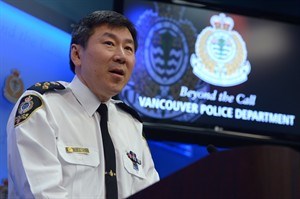
Vancouver Police Chief Jim Chu speaks at a news conference in Vancouver on Friday, Jan. 23, 2015. Chu is set to retire after leading the department for more than seven years. THE CANADIAN PRESS/Jonathan Hayward
Republished January 23, 2015 - 4:52 PM
Original Publication Date January 23, 2015 - 9:50 AM
VANCOUVER - Vancouver's police chief, whose tenure included a public inquiry into the Robert Pickton case, the Stanley Cup riot and a bloody gang war, is retiring.
Chief Jim Chu, who has been with the force for 36 years and became the city's top police officer in 2007, told a news conference Friday that it was time for a change in leadership.
"We have a great city with wonderful people and we have great people in the organization that I'm responsible for leading," said Chu. "But it is time to retire."
Chu, who's in his mid-50s, will remain in the position until the police board picks a successor, likely by the spring. He said he doesn't have another job waiting for him and he hasn't decided what to do next.
Chu acknowledged that he has previously been approached by political parties encouraging him to run for office. He's declined every time, but he didn't say whether that might change once he's no longer chief.
"I didn't want to be actively looking for the next step while I was serving as police chief," he said. "Now that I'm leaving, I guess I'll have to look around a bit more."
Chu joined the force in 1979. He was appointed deputy chief in 2003 and took over from former chief Jamie Graham four years later.
Vancouver Mayor Gregor Robertson pointed to decreasing crime statistics as he thanked Chu, who he described as a friend, for making the city safer.
"We will miss you so much, Jim," said Robertson.
Much of Chu's time as chief was overshadowed by the Pickton case and the force's failure to stop the serial killer from preying on sex workers in the city's troubled Downtown Eastside.
One of his deputy chiefs, Doug LePard, authored a scathing internal review that found numerous faults with how the force handled the case and the department participated in a public inquiry that reached similar conclusions.
Chu and LePard both issued public apologies for not catching Pickton sooner.
The force implemented a policy in January 2013 that placed safety ahead of enforcing anti-prostitution laws. The policy, which was lauded by advocates, says "sex work involving consenting adults is not an enforcement priority."
Chu said at the Friday news conference that the force was moving in the right direction in the Downtown Eastside, but he said there is more work to do.
"We're going to continue to work with all of our partners, including those in the Downtown Eastside, to assure them that we care about safety for every person in Vancouver," he said.
He was also the public face of the force in the aftermath of the 2011 Stanley Cup riot, which saw jersey-clad fans smash windows, loot stores and set cars on fire after the Vancouver Canucks lost Game 7 of the final.
The department was criticized for allowing the crowds to deteriorate into a riot and for the slow pace of the subsequent investigation.
On Friday, Chu pointed out that more than 300 people have been charged — proof, he said, that the department was right to take its time and ensure the investigation was done properly.
He made headlines in 2009 when he admitted his city was in the midst of a gang war and he also oversaw the department as it relaxed its approach to marijuana, which has helped fuel the proliferation of storefront medical pot dispensaries in the city.
Robert Gordon, a criminology professor at Simon Fraser University, said Chu is one of the top police chiefs in the country.
In particular, Gordon pointed to Chu's decision to apologize for the force's mistakes in the Pickton investigation.
"I thought there that it was his very clear preference for transparency that shone through, in stark contrast to what the Mounties did," said Gordon.
"His whole approach was quite different and refreshing."
Doug King of Pivot Legal Society, a non-profit group that focuses on legal issues facing marginalized and poor people, said the relationship between the police and residents of the Downtown Eastside has improved under Chu.
"There was a bit of a sea change when Jim Chu took over in terms of how the department handled the Downtown Eastside," said King.
"That being said, we still have some big issues with the relationship between marginalized people in the Downtown Eastside and the VPD."
— Follow @ByJamesKeller on Twitter
News from © The Canadian Press, 2015